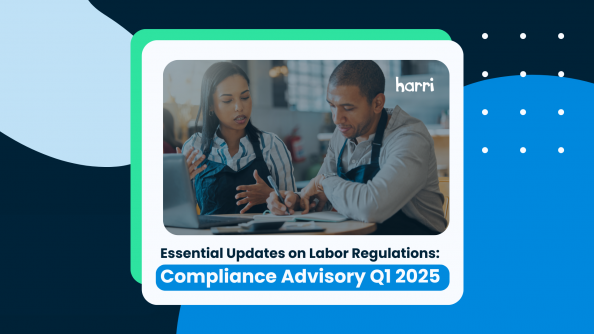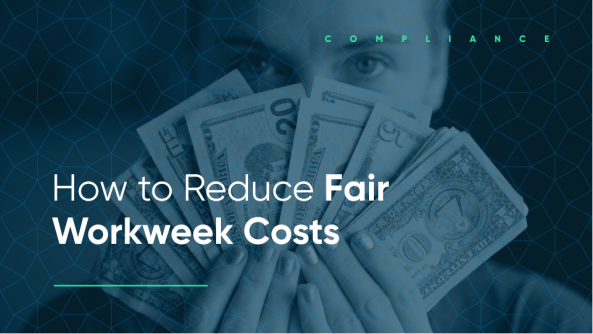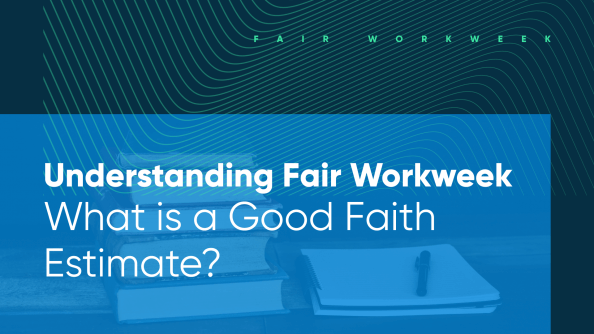NYC ‘Just Cause’ Legislation Enforced on July 4th. Are You Prepared?

- By Harri Insider Team | June 23, 2021
NYC restaurant operators are no stranger to Fair Workweek predictive scheduling laws, which seek to regulate and stabilize schedules for hourly workers. Beginning July 4, 2021, NYC Fair Workweek will expand to remove at-will employment.
For those unfamiliar with the term, “at-will employment” means that employers have the ability to dismiss an employee without reasonable cause, so long as the employer isn’t discriminating against race, sexual orientation, religion, etc.
The removal of at-will employment means that hospitality employers must have “Just Cause” to terminate an employee. They also must follow “progressive discipline” steps before they’re permitted to dismiss said employee.
Understanding NYC ‘Just Cause’ and Progressive Discipline
Just Cause legislation applies to Fair Workweek covered businesses in NYC, specifically fast food restaurants with 30+ locations, including franchisors and franchisees.
NYC defines fast food as any business with counter service — meaning that fast casuals may be included but establishments like fine dining tend to be exempt.
If an hourly employee has worked with a hospitality business for at least 30 days, the employer cannot fire, suspend, or reduce their hours by 15% without Just Cause.
Employers will have Just Cause to terminate an employee or administer other disciplinary measures if an employee breaks workplace policy or consistently underperforms in their role. But there are a few different pieces to Just Cause legislation that must be understood and enacted first.
We recently hosted a webinar with our Partners at Fox Rothschild to unpack guidance and understanding. Please view the content below:
Training on workplace expectations and policies
The first piece of this legislation is employee education. According to the legislation, if an employee isn’t made fully aware of job expectations or workplace policies, they can’t be expected to perform in full.
Operators should give employees full and thorough training on:
- Standard workplace policies related to PTO, lateness, cash drawer discrepancies, etc
- Job description, skill requirements, and expectations
- An employee’s performance expectations
- Progressive discipline when policies are violated (explained below)
Maybe an employee ended up arriving 10 minutes late to work two days in a row due to commuting slowdowns outside of their control. Is this considered a workplace policy violation? Make sure it’s understood from the get-go.
Enacting progressive discipline when a violation occurs
So when that employee arrives 10 minutes late two days in a row, does an employer have grounds to terminate them? Not yet.
The progressive discipline clause of NYC Fair Workweek states that employers must slowly escalate disciplinary measures as an employee continues to break policy.
A first violation might result in a verbal warning. The next might be a written warning. The third violation may lead to a final notice, which is followed by termination if and when the employee commits a fourth violation.
These progressive discipline measures must be outlined in workplace policies, applied to every employee consistently, and must be documented when they occur. Notice of an employee termination or significant schedule cut must be provided in writing alongside the reason(s) or violations committed by the employee.
12-month rolling violation window
It’s extremely important to understand that an employee’s disciplinary records are wiped clean after 12 months. That means someone might be on their third warning, but once 12 months pass from 30 days of their hiring, their disciplinary record is reset to zero.
Just Cause Exemptions and Last In, First Out
There are some instances where an employer is permitted to make layoffs without requiring Just Cause and progressive disciplinary measures. While these are still being defined (we’ll update this when we know more), they relate to profitability, operational capacity, and seasonality.
But when an exemption is available, Just Cause legislation also aims to protect employees with seniority. Employers can only lay off their most recently hired employees.
This means operators must be strategic about who they hire, and when. A sudden operational change may require that a brand needs more cooks than servers. But if your most recent hire was a cook, you must lay off that cook if you choose to enact layoffs, even though it’s counterintuitive to business needs.
Complying with NYC ‘Just Cause’
We want to assure our clients that we’re ready to offer a set of new features that respond to ‘Just Cause’ requirements. Those details are as follows:
New Features Available as of July 4th 2021:
- The system will alert hiring managers 25 days after an employee’s first day.
- Terminations can be restricted to specific managers 30 days after an employee’s first day.
- A warning will be issued when an employee is scheduled less than 15% from the highest total hours in their regular schedule within the previous 12 months.
To activate these features, please reach out to your Customer Success Manager or request a demo here.




















